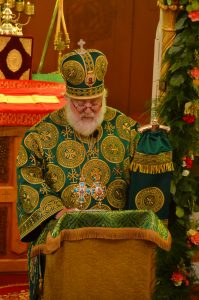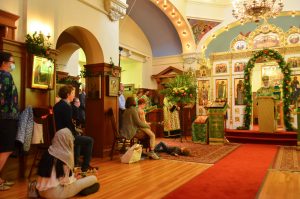In the name of the Father, and of the Son, and of the Holy Spirit. Amen.
As I am sure many of you already know, I am rather fascinated by what we might call the fulfillment of the prophecies, rites, and customs of the Old Covenant in the New — in particular, in Orthodox Christianity. I understand Christianity to be the heir to all the Law and the Prophets gave witness to.

Our present celebration of Pentecost is no exception. Pentecost is not a uniquely Christian feast. Its roots are to be found in the Jewish feast known as Shavu’ot or the Giving of the Torah which occurred 50 days after Passover and was the second of three major harvest feasts of the Jewish people. 49 days (49 being 7×7 or a “week of weeks”) after the Passover, the people of ancient Israel were commanded by God to bring the first fruits of the grain harvest to the Temple to be offered to the Lord in thanksgiving in the form of two loaves of bread made from the newly harvested wheat. It was· a day of great celebration when Jewish males were expected to be present in Jerusalem if at all possible. This festival is mentioned five times in the Torah, the books of Moses.
Not only was Shavu’ot a celebration of the new harvest, as I mentioned, but it was also connected to the giving of the Law to Moses of Mt. Sinai. As such, it represented the birth of Judaism. It was the Law that formed the people recently freed from their bondage to Pharaoh in Egypt into a new nation and the people of God. It is interesting to note, that Jewish sources emphasize the giving of the Law and not its having been received. The act of receiving the Law was understood to take place daily as one lived one’s life according to the law.
For Christians, who — as I have pointed out — are the heirs of the Law and the Prophets, Pentecost is both the giving of the Holy Spirit from God the Father in the form of tongues of fire and His reception by the Disciples who had gathered on the day of the feast.. The Hebrew people, freed from Egypt were given the Law fifty days after the sacrifice of the paschal lambs; and today, fifty days after The Paschal Lamb (who was merely prefigured in the lambs in Egypt) suffered His saving Passion and is raised from the dead, the Holy Spirit is given to the apostles and to the whole group of believers gathered together with them. Where Jews understood the day to be the birth of Judaism; we Christians see this day as the birth of the Church. Where Jews celebrate the giving of the Law; Christians rejoice in the outpouring of God’s own Spirit upon the followers of Christ, the Promised Messiah. Where the Law was written on tablets of stone; today the grace of the Spirit is inscribed in hearts of flesh within each of the faithful. As Israel was freed from slavery in Egypt, from idolatry and immorality, and became a new nation; the New Israel, the people of the New Covenant, the Church, are freed from sin and death and called to be what St. Peter calls a holy nation:
… we have been born anew to a living hope through the resurrection of Jesus Christ from the dead, and to an inheritance which is imperishable, undefiled, and unfading, kept in heaven for you, who by God’s power are guarded through faith for a salvation ready to be revealed in the last time. (1 Peter 1)

St. Clement of Alexandria, commenting on 1 Peter, chapter 2, says:
That we are a chosen people is clear enough; but Peter said that we are a royal people because we have been called to share Christ’s kingdom and we belong to him. We are a priesthood because of the offering which is made in prayers and in the teachings by which souls which are offered to God are won.
In ancient times, only the high priest was anointed, but now all Christians are anointed with the chrism and with it are given the seal of the gift of the Holy Spirit, that same Holy Spirit that rested on the head of each of the disciples accompanied by a sound from heaven like the rush of a mighty wind on this day of Pentecost.
There is something both individual and corporate about this event. Note that the followers of Jesus, both the disciples and faithful, were gathered together in one place (Acts 2:1). They were, in a sense, called out of the world on that day by God to become something greater than the sum of their individual parts. They became the Church, no longer just a group of individual persons who followed Jesus of Nazareth, but, by the Holy Spirit, were fashioned into the Body of Christ. We too, on this Great Day, have been called out of the world by that very same Holy Spirit to become the Church and have become something greater than ourselves. But in doing this, in making this mystery happen to the group, the Spirit descends upon each one individually in the form of a flame of fire. The significance here, I believe, is that everyone is given a gift of grace particular to him or her. But only together, as a group, are they able to become the Body of Christ, the Church. Only together, as a group, is the power of that gift made fully manifest.

Where Israel gathered in Jerusalem to celebrate the giving of the Law and the new harvest of grain, we gather together in this place to receive the Holy Spirit and the harvest of human souls. As the Temple was the place of God’s presence among the people of the Old Covenant, on this day each of us becomes a living temple and the human heart the place where God has pitched his tent among us in this world.
May the same Spirit that descended upon those gathered together on Pentecost, rest in each of us.
Amen.